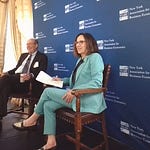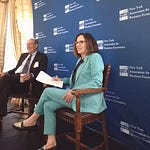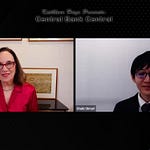The Bank of Japan surprised no one when it held its key rate steady at this week’s policy meeting. True, Japan’s latest inflation numbers have continued to pave the way for another rate cut now and potentially more over the course of the year. The Shunto spring wage negotiations are showing the best numbers in 34 years. Japan’s CPI measures show all of them rising at a rate that suggests more BOJ rate hikes are warranted if not needed now.
The question now is when will the BOJ feel confident enough that Japan inflation will stay high enough in a world where President Trump is running a tariff-centered growth and exchange-rate driven policy that will still allow to execute another widely expected key interest rate hike in Japan.
Enter Masazumi Wakatabe, longtime Waseda University economics professor who served as a BOJ Deputy governor during the second and final five year term of former BOJ governor Haruhiko Kuroda. He joined me to discuss the policy decision of the BOJ and where they are likely to head next at a time when the Fed has signaled uncertainty rules its next policy steps.
So dive in and hear what he has to say. Importantly even as the world waits to see what tariff steps the Trump team announces on April 2, Masazumi sees the BOJ on the path to its next rate hike as early as its meeting next month.
Uncertainty stalks the BOJ 00:01:22.570
Uncertainties and downside risks are the reason that why the BoJ did not hike interest rates this time around. I think that the having said that the BOJ still feels very confident <about its decision> given the heightened uncertainty about the trade policies. The BoJ says, the governor keeps saying, that their projections, predictions, about price dynamics, inflation dynamics, are in tune with their own <previous> predictions. They feel their predictions are still being vindicated. So you know, even so uncertainty is the one reason that that the governor, postponed the interest rate hike this time.
Potential rate hike dates 00:02:25.420
During the press conference he said that the wage growth figures will be available in April, early April. And whatever happens to right now about the tariffs and trade policies things should be clearer in early April. Okay? So if they are thinking like that, we cannot exclude the possibility that the BOJ is going to hike interest rates at the next meeting that is going to be held in April on the 30th and May the first. Maybe the BOJ is going to raise interest rates. And remember that the Governor does not want to tie his hands. So that's why he gives us the April or the May date, the rate hike is still a possibility.
April is possible but it might be too-soon 00:05:31.960
If you think that the price inflation may be on the rising side, they're going to have to rush to a rate hike. That's kind of the rationale. So I think that the April May meeting is a possibility <but uncertainty>, that's the number one item, I think it's here. But remember first of all it's not clear that this uncertainty will be gone by early April.
Trump’s style will not change 00:05:47.500
I think that Trump's you know, the style of policy making is actually sowing a lot of uncertainties into the economy. And I don't think that style would change anytime soon. The economic impact of the Mr. Trump's tariff policies… could slow down the world economy and Japan is quite dependent on that and on the American market.
Risks from tariffs mushroom 00:08:38.330
Well, as far as we know, the tariffs could be just bad for the Japanese economy. There is nothing good about the tariffs being imposed by the Americans, so there are several sort of estimates… but I think Japan would be affected by 2 factors. One is the slowdown of the Japanese exports to the American market, and also remember that, secondly, the Americans are imposing tariffs on the Chinese goods and services. If the Chinese economy slows down, Japanese export to China would also slow down.
Bad tariff…good tariff? 00:09:40.269
I said that tariffs are bad for the Japanese economy. But there is one other, actually the positive, channel which may or may not materialize. Suppose the Americans impose tariffs on Mexicans and also the Canadians. Okay, then, if the Americans charge higher tariffs on them, then, even though, that the tariffs are on, they may have to buy more Japanese goods! So if that's the case, the tariffs on other countries could benefit Japanese exports. But that's only a possibility. I'm not quite sure that will materialize. But suppose you know that the dollar appreciates, (which means that the yen depreciates), that's a kind of sustaining factor for the Japanese economy <that could also offset tariffs>. So, while I say that the tariffs are bad, I think that there are several sort of possible positive channels, too.
Normalizing wages set Japan free 00:15:31.100
The huge part of the arc for Japan is getting out of deflation. And so finally, Japan is kind of being normalized, as I keep saying that this is a welcome development, of course. But this is the second time, you know, that's the we have had robust, nominal wage growth, so that we're going to have to keep moving on and keep sustaining this wage growth.
BOJ relieved, but still not certain 00:16:04.060
So I think that the BOJ right now feels very much relieved. And I think that the BOJ fears that their predictions could be negated, so that that gives another reason that we cannot really exclude a hike at the next meeting. My main message is that Japan is at critical juncture, so we have positive signs, and still not so positive signs. Getting out of deflation is still not a done deal. That's my basic take.
Professor Masazumi Wakatabe
Research Field
Economic history, central bank theory
degree
M.A., University of Toronto, 1994
Biography
His research interests include the historical relationship between economic crises and economics, and central banking. He has served as a visiting scholar at the University of Cambridge, George Mason University, and the Center for Japanese Economy and Business at Columbia University, vice president of the American Association for the History of Economic Thought (2016-2017), and deputy governor of the Bank of Japan (March 2018-March 2023). His publications include Research on the Showa Depression (2004: Nikkei Prize for Economic Books), Economic Policy in Crisis (2009: Ishibashi Tanzan Prize), and Japan's Great Stagnation and Abenomics (2015).Professor Masazumi Wakatabe
Research Field
Economic history, central bank theory
degree
M.A., University of Toronto, 1994
Biography
His research interests include the historical relationship between economic crises and economics, and central banking. He has served as a visiting scholar at the University of Cambridge, George Mason University, and the Center for Japanese Economy and Business at Columbia University, vice president of the American Association for the History of Economic Thought (2016-2017), and deputy governor of the Bank of Japan (March 2018-March 2023). His publications include Research on the Showa Depression (2004: Nikkei Prize for Economic Books), Economic Policy in Crisis (2009: Ishibashi Tanzan Prize), and Japan's Great Stagnation and Abenomics (2015).














Share this post